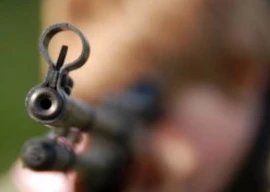
With the demise of Dr Nabi Bux Baloch on Wednesday, an era of profound and peerless knowledge was laid to rest. He had the rare honour of being buried by the side of Allama I I Kazi and Elsa Kazi’s mausoleum in the University of Sindh. He was 93.
Baloch wore many hats: anthropologist, historian, researcher, writer and educationist. “Dr Nabi Bux Baloch never retires,” his friends and foes used to always say. Indeed, he only retired when his time on this earth was up.
Dr Baloch died of cardiac arrest at around 3 am on Wednesday. He is survived by five sons and three daughters.
The literary circles of Sindh have announced seven days of mourning and the Sindh culture department has announced it will stop work to mourn his death. The University of Sindh also remained closed on Wednesday in mourning.
Baloch was born on December 16, 1917, in Jaffar Khan Laghari village in Sanghar district. After completing his high school education from a school in Naushehro Feroz, Dr Baloch completed his Bachelors (honours) from Bahauddin College in Junagadh and then his Masters and LLB from Aligarh University in 1943 where he came first. “Ghulam Mustafa Shah and Hakeem Muhammad Saeed were his colleagues at Aligarh University,” recalls 96-year-old writer and historian Ibrahim Joyo. “His death is a loss for all that we know about Sindh.”
The academic and professional credentials of Dr Baloch are astounding. He did not rest at the education achieved thus far. He travelled to the US in 1947, for a second Masters in education from the Colombia University, New York. He also acquired a doctorate from the same university.
Literary achievements
He has written over 150 books. His works include translations, compilations and writings in Sindhi, Persian, Arabic and English. He wrote more than 40 volumes on Sindh’s folklore.
“Vast-ranging research on people living in the deserts, mountains, riverbeds, forests and the delta is included in the folk literature,” explains Mazharul Haq Siddiqui, the Federal Public Service Commission’s former chairman and Sindh University’s former vice-chancellor. “No scholar other than Dr Baloch himself could dare to undertake the colossal work of producing 40 volumes on folklore.”
In lexicography, Dr Baloch’s contributions are no less than ‘magisterial’. He was an adviser for the Oxford University Press (OUP) team that compiled the first-ever English-to-Sindhi concise dictionary.
He also produced definitive dictionaries of Sindhi before the OUP one. “It was GM Syed who persuaded Dr Baloch to start work on a Sindhi dictionary and folk literature,” informs Ghulam Ali Allana, the former vice-chancellor of Sindh University.
Among the most remarkable works of his life are the 10 volumes of Shah Abdul Latif Bhitai’s poetry, despite all the controversies attached to the work.
“He rejected that the poem Sur Kedaroh was a genuine Bhitai, perhaps because Dr Baloch was a protégé of Dr Allama I I Kazi who also rejected the poem as a Bhitai original. “They considered it a later insertion,” according to Allana.
Teaching career
Baloch was a professor of education in Sindh University from 1951 to 1976 and also served as vice-chancellor from 1973 to 1976.
In 1980, he assumed charge as the rector of International Islamic University in Islamabad, for two years. In 1990, Dr Baloch became the founding chairman of the Sindhi Language Authority and remained there till 1993, when he was inducted as education minister in the caretaker Sindh cabinet.
The National Commission for Historical and Cultural Research was upgraded to the Institute of Islamic History, Culture and Civilization under him.
Awards
Dr Baloch was the recipient of numerous awards, medals and certificates. The presidential award “Aizaz-e-Kamal” was conferred upon him in 1991.
He was also awarded the Sitara-e-Imtiaz, the Tamgha-e-Pakistan, Sitara-e-Quaid-e-Azam and the Pride of Performance.
Published in The Express Tribune, April 7th, 2011.


1723278472-0/BeFunky-collage-(4)1723278472-0-165x106.webp)














COMMENTS (2)
Comments are moderated and generally will be posted if they are on-topic and not abusive.
For more information, please see our Comments FAQ